
A Confederacy of Dunces is a picaresque novel by American novelist John Kennedy Toole which reached publication in 1980, eleven years after Toole's death. Published through the efforts of writer Walker Percy and Toole's mother, Thelma, the book became first a cult classic, then a mainstream success; it earned Toole a posthumous Pulitzer Prize for Fiction in 1981, and is now considered a canonical work of modern literature of the Southern United States.
Victor Canning was a prolific British writer of novels and thrillers who flourished in the 1950s, 1960s and 1970s. He was personally reticent, writing no memoirs and giving relatively few newspaper interviews.
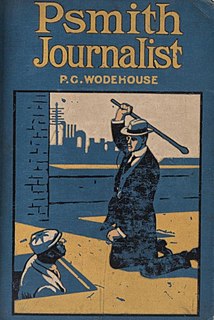
Psmith, Journalist is a novel by P.G. Wodehouse, first released in the United Kingdom as a serial in The Captain magazine between October 1909 and February 1910, and published in book form in the UK on 29 September 1915, by Adam & Charles Black, London, and, from imported sheets, by Macmillan, New York, later that year.
Mr. Finchley is a fictional character in three comic novels by Victor Canning, a novelist who later gained great success with thrillers. He first appears in Canning's very first book, Mr. Finchley Discovers His England, published in 1934 and as Mr. Finchley's Holiday in the USA in 1935.

Miss Brown of X. Y. O. is a 1927 mystery thriller novel by the British writer E. Phillips Oppenheim. It was notable amongst thrillers of the time for its use of an everyday female character as heroine.

Mr. Finchley Discovers His England is a 1934 comedy novel by the British writer Victor Canning. It was published by Hodder and Stoughton, and a US edition published by Reynal and Hitchcock appeared in 1935 under the title Mr. Finchley's Holiday, and there were post-war editions from Pan Books, Heinemann and, recently (2019), from Farrago Books. It was the first of a trilogy starring the mild-mannered Edgar Finchley. The novel was a bestseller and allowed Canning to leave his job and devote himself full time to writing, later becoming known in particular for his thrillers.
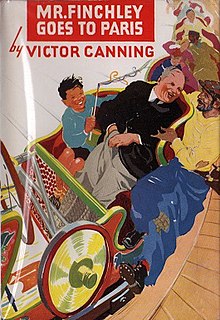
Mr. Finchley Goes to Paris is a comedy novel by the British writer Victor Canning. It was the second of a trilogy featuring the mild-mannered Edgar Finchley. The first publication in 1938 was by Hodder and Stoughton in the UK and Carrick and Evans in the USA. It was included in the Heinemann Uniform Edition of 1974, and a new edition has recently appeared (2019) from Farrago Books. In 1990 it was adapted for radio by the BBC starring Richard Griffiths
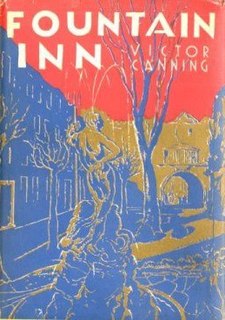
Fountain Inn is a 1939 mystery detective novel by the British writer Victor Canning. Canning had made his name with his comedy novels featuring Mr. Finchley. This was his first attempt at a thriller, but after the war he increasingly switched to writing thrillers. It received positive reviews with The Guardian noting "Fountain Inn, which is extremely well written, is the attractive kind of detective story in which the main interest is not “Who?” but “How?”". The first edition was by Hodder and Stoughton, but there was a reissue in 1974 by Heinemann, and it was republished in 2019 by Farrago Books.

The Chasm is a 1947 thriller novel by the British writer Victor Canning. It was his first novel since the Second World War during which he had served in the Royal Artillery and was largely absent from the writing world. Later he increasingly turned to espionage and crime novels. It takes place in Italy where Canning had served during the Italian campaign.

Green Battlefield is a 1943 war thriller novel by the British writer Victor Canning. It was published by Hodder & Stoughton and was the only novel he wrote during his military service in the Royal Artillery. Although comparatively successful, and reprinted in 1944, Canning himself was later dismissive of the novel saying "It was a topical book. I spun it off to cash in on the war story thing. It was quite a competent story, but nothing I’d want in the canon of works!." Nevertheless, it was translated into Italian and French, the first time his work had appeared in those languages.
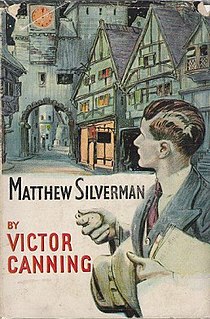
Matthew Silverman is a 1937 novel by the British writer Victor Canning, his sixth. Canning had made his name with the comedy novel Mr. Finchley Discovers His England and wrote a number of works focusing on more everyday aspects of British life before later switching to be a well-known author of thrillers. The first publisher was Hodder and Stoughton, but a new edition has recently (2019) appeared from Farrago Books under the title The Uncertain Future of the Silvermans.

Queen's Pawn is a 1969 thriller novel by the British writer Victor Canning. The title is a reference to the chess opening of the same name and the fact that much of the novel's action centres around the Queen Elizabeth 2 ocean liner. It was his first novel after finishing the Rex Carver series of spy adventures.

The Whip Hand is a 1965 spy novel by the British writer Victor Canning. It is the first in a series of four novels about Rex Carver, a private detective drawn back into his old profession of espionage. The novel also features the secret service agent Manston who had previously appeared in The Limbo Line, Canning's previous novel.

Doubled in Diamonds is a 1966 spy thriller novel by the British Victor Canning. It is the second in a series of four novels about Rex Carver, a private detective drawn back into his old profession of espionage.

The Python Project is a 1967 spy thriller novel by the British Victor Canning. It is the third in a series of four novels about Rex Carver, a private detective drawn back into his old profession of espionage. A complex plot which involves a jewel robbery and the exchange of prisoners between the British and Soviet intelligence services takes place in a variety of locations including London, Paris, Libya and the Balearic Islands.

The Scorpio Letters is a 1964 thriller novel by the British writer Victor Canning. Following this stand-alone novel he began his Rex Carver series with The Whip Hand the following year.

The Viaduct is a 1939 historical novel by the British writer Victor Canning, under the pen name of Alan Gould. The novel revolves around the construction of a railway viaduct across the River Tamar in the Cornish village Caradon in the 1870s overseen by the engineer John Seabright. It faces many obstacles including an outbreak of typhoid and the constant tension between the local inhabitants and the rough navvies brought into build it, ending up in a death and a trial.

Family Affairs is a 1950 detective novel by John Rhode, the pen name of the British writer Cecil Street. It is the fifty first in his long-running series of novels featuring Lancelot Priestley, a Golden Age armchair detective. It was published in America by Dodd Mead under the alternative title The Last Suspect. It has been described as "probably the best post-war Rhode novel".
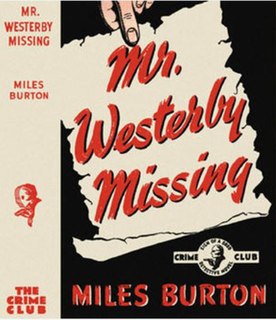
Mr. Westerby Missing is a 1940 detective novel by the British writer Cecil Street, writing under the pen name of Miles Burton. It was the twenty-second in a series of books featuring the detective Desmond Merrion and Inspector Arnold of Scotland Yard. It was published in the United States by Doubleday the same year.

Death Knows No Calendar is a 1942 detective novel by the British writer John Bude. It was a stand-alone novel rather than one featuring his regular detective Superintendent Meredith. In this case the investigation is led by a former army officer Major Boddy. It takes the former of a locked room mystery with a closed circle of suspects, both popular variations of the genre during the period. Originally published by Cassell, in 2020 it was reissued by the British Library Publishing in a single edition with another Bude novel Death in White Pyjamas, as part of a series of republished crime novels from the Golden Age of Detective Fiction.


















